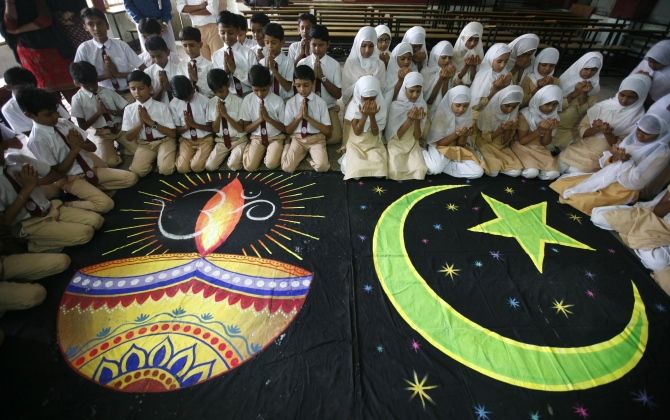 | « Back to article | Print this article |
'Once the common man realises that living in harmony, respecting, loving and protecting each other is the real meaning of secularism, and treating everyone equally to safeguard our Constitution and motherland is patriotism, there will be no opportunity for communalism,' says Ram Iyer.

Secularism, patriotism, nationalism, communalism -- I have been confused for some time now about what these words literally mean. Even if I go by the definitions provided by various political parties, I am unable to distinguish among any of the above.
When I rewind the reel of my life to childhood, I recall the wonderful atmosphere, the surroundings, the feeling of security, brotherhood, affection, togetherness and society.
I grew up in Kerala amid Hindus, Muslims, Christians, Muslims, Scheduled Castes and Scheduled Tribes, without even having an inkling about which religion preached/practised what. The lyrics in the song Maveli Naadu Vaneedum Kaalam... Maanushar Ellarum Onnu Pole (All Human Beings Are The Same) was visible in practice everywhere.
I went to school with my Muslim friends while I celebrated Onam and Vishu with my friends George and Abdulla at my home. Christmas celebrations used to be in Chacko's house where a special vegetarian lunch used to be prepared by his mother for us.
Sainaba Umma, my neighbour, was very particular during Ramzan and Bakri Id; my elder brother and I used to have lunch at her home, which she used to prepare especially for us. I remember a couple of years ago when I visited my village the Muslim neighbour enquiring with my mother and saying -- Mon vannittundu alle, perunnaal alle, monuvendi neichoru tharam kazhikkoole (Your son has come, it is his birthday today, I shall make ghee rice for him) -- such affection is still maintained with each other!
Being in isolated homes on estates, whenever our parents travelled we were left in the company of Abu and Sainaba at home for a couple of days -- Abu even took me to a mosque on a Friday to see how they offer prayers there.
Every year, without fail, I attend the Perunnal (a festival) at the famous Pallikunnu Church in our village. The only thing that I can't do is a kumbasaram (confession) with the priest. The entire village is a large family, respecting and loving each other -- and they continue that tradition to this day.
Nobody ever bothered about religious practices or interfered with religious activities. At times, the Hindu, Muslim or Christian festivities happened simultaneously in nearby areas, bringing a celebratory air to the village, with absolutely no untoward incidents or altercations.
It is known that the God's Own Country (Kerala) is the most literate state in India and everyone starts their day reading the newspapers and hearing the news on radio. With strange things happening elsewhere in the country, there are no incidents of people getting insecure or being incited towards communal disharmony.
While this scenario is prevalent in most villages, towns, cities and neighbourhoods, of late the least important incidents are gaining undeserved attention and importance, providing fodder to the politicians to divide the people along communal lines to ensure their respective vote banks.
When most of us do not have any problems with other religions and vice versa, we should not fall for the mischief of calculated theories and actions that benefit the selfish interests of a negligible lot.
Once the common man realises that living in harmony, respecting, loving and protecting each other is the real meaning of secularism, and treating everyone equally to safeguard our Constitution and motherland is patriotism, there will be no opportunity for communalism.
And if we are able to achieve this, most of the so-called politicians with a 'secular agenda' will be rendered jobless!
IMAGE: Hindu and Muslim school children offer prayers for peace at their school in Ahmedabad. Photograph: Amit Dave/Reuters